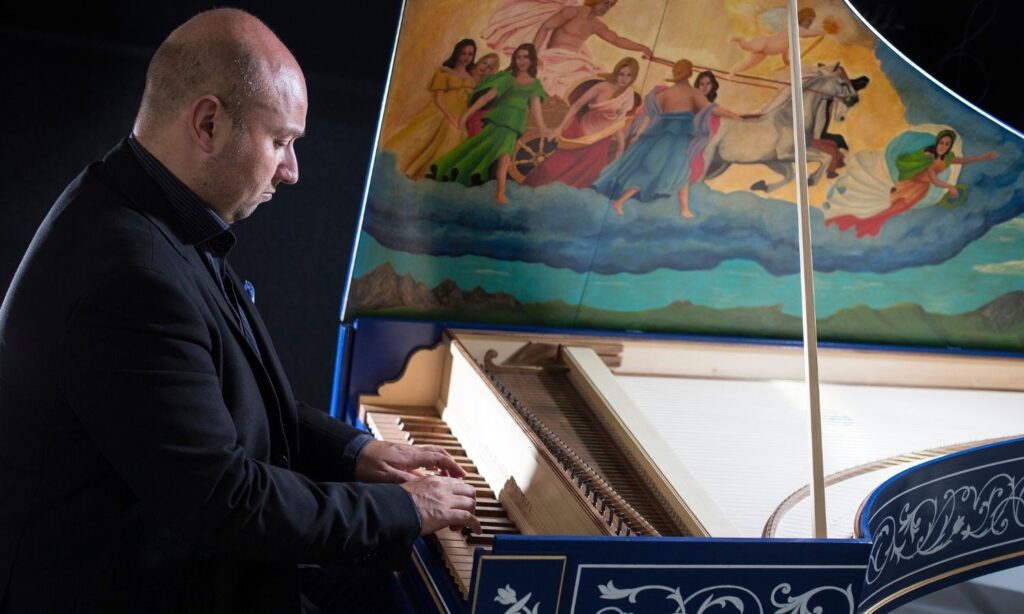Harpsichordist Busettini surveys Roman keyboard virtuosos with mixed results

Alberto Busettini performed a recital for Capriccio Baroque Saturday evening.
The Capriccio Baroque series of harpsichord concerts for small audiences returned to its home base Saturday evening, a private home in Northwest Washington. Italian harpsichordist Alberto Busettini, a series regular, performed a challenging program combining three composers active in Rome around the year 1708. The musical style, intended to test the technical force and fluency of the harpsichord, pushed the performer to his limits.
Representing the older generation was Bernardo Pasquini, born near Pistoia, who settled in Rome in his early twenties. His 50-year career there ended with his death in 1710. Busettini offered a selection of the composer’s pieces from a manuscript source in London, beginning with an unusual Toccata. In contrapuntal sections with some outbursts of daring passagework, Busettini’s fingers were not always accurate, and some adjustments of tempo became necessary.
In the less demanding dances that followed, like the melancholy Allemanda, Busettini fared much better, his poetic rubato molding phrases with individuality. In the Capriccio, he made a fine tribute to the presenting series, choosing a softer registration and adding embellishments to the repeats. The bolder Bergamasca featured delightful shifts between tutti and solo sounds by switching between the double manuals on the series’ harpsichord built by Colin Booth.
Alessandro Scarlatti, the opera composer and father of keyboard specialist Domenico Scarlatti, spent most of his career in Naples. From 1703 to 1708, he worked in Rome for Cardinal Pietro Ottoboni, the nephew of Pope Alexander VIII. The vice-chancellor of the Holy Roman Church for over fifty years, Ottoboni was a major patron of music, having supported Corelli, Vivaldi, and Caldara. Busettini performed the elder Scarlatti’s Toccata d’ottava stesa, a 25-minute extravaganza ending with twenty-nine variations on the “Follia” melody.
The fast sections of this piece are mostly just about shameless virtuosity, and the full effect is missed when the technical acumen of the player is not quite up to the task. Fortunately, this performance still had its highlights, and Busettini excelled in the intervening Adagio portions of the piece, adding poetic nuances and clarity of voicing. At the end of the “Follia” variations, Busettini opted not to take the Dal Segno repeat back to the first variation, which concluded the piece, somewhat unsatisfyingly, on a dominant chord.
The bulk of this 90-minute recital, played without intermission, was devoted to the harpsichord music of Georg Friedrich Händel, before he went to England and anglicized his name. After an early career in Hamburg, the young German resided in Rome from 1706 to 1710. Among his many patrons there was none other than Cardinal Ottoboni, for whom he composed his oratorio Il trionfo del tempo in 1710, just before he was hired by the future King George I of England.
In the Chaconne in G Major, Busettini used the instrument’s subtle shades of registration to emotive effect. The minor-mode section of the piece succeeded best, featuring the most delicate sounds. Kudos to Busettini for programming some unusual harpsichord arrangements of Handel works for other instruments, beginning with John Walsh’s version of the lengthy overture to Il Pastor Fido, premiered shortly after Handel resettled to London. The performance highlighted Handel’s harmonic creativity, with registration shifts to bring out orchestra-sized dynamic contrasts.
Busettini elided this multi-movement overture with the Suite in D Minor, proceeding into its Prelude without a break. Especially in this piece’s most florid movements, like the Air avec Doubles, one heard the Roman influence on Handel’s style at the keyboard. The Air has written-out ornamentation, giving a hint of the extravagant variations a player like Handel could improvise on the repeats. The last movement, a sparkling Presto, made demands equal to those in the earlier Italian pieces.
Handel made his name in London, somewhat unexpectedly, as an Italian opera composer. Busettini offered two encores in all but name with a pair of arias from Rinaldo, the first Italian opera Handel produced in London, arranged as harpsichord blockbusters by William Babell. “Lascia ch’io pianga,” fitted out with rich ornamentation, sounded much more assertive than mournful, still dwarfed by the showiness of “Vo’ far guerra.” The latter, with playful back and forth between the manuals and some more technical struggles for Busettini, made an astounding tour de force to close this fascinating recital.
Colin Booth, who built the instrument played in this recital, will perform two programs on July 13 and 15. capricciobaroque.org
